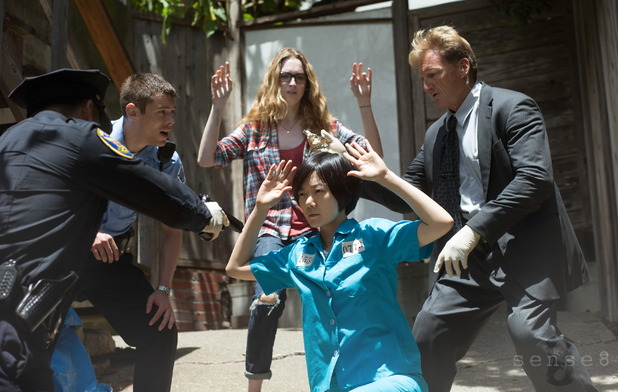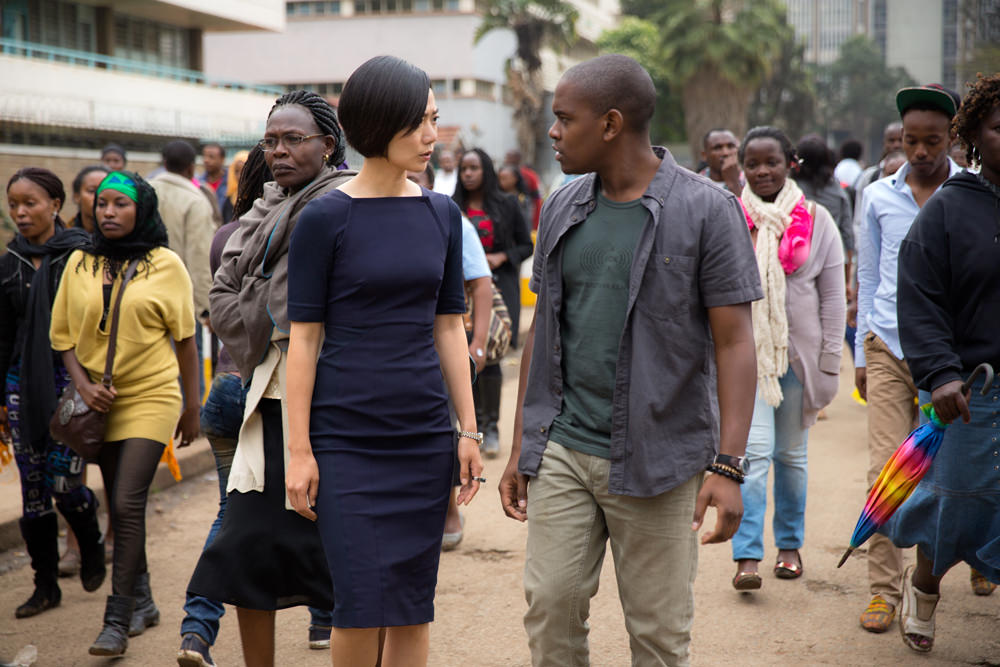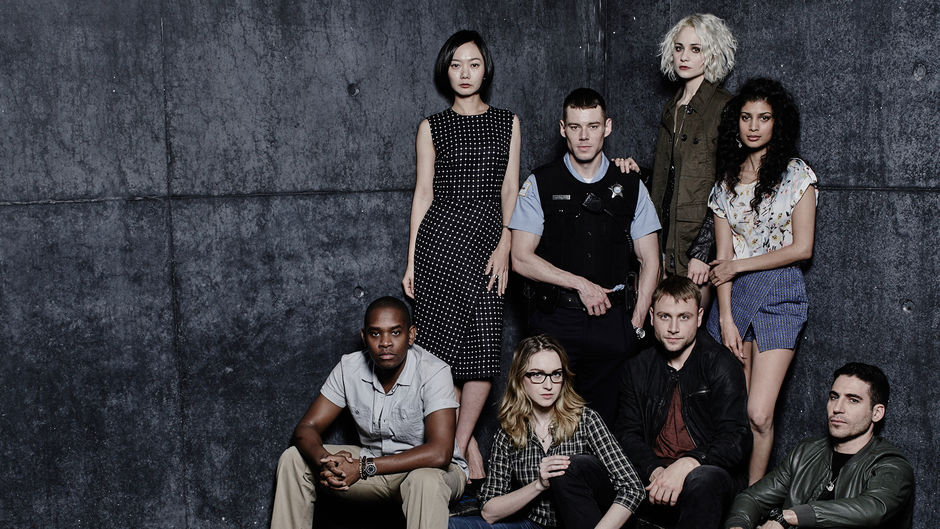Capheus' line from the fifth episode gets at one of my favorite aspects of this show: the question of
what makes us who we are. And also how who we are can bind us to others from around the world no matter how dissimilar we might seem. It also comes in the moment I knew I was going to go all in on this show. I think the 4 Non Blondes singalong from the fourth episode was a landmark moment of the series, but the conversation between Sun and Capheus in this episode marked the true strength of the series for me. It's two people who couldn't be more different; Capheus an African man with an exuberant and outgoing, optimistic personality, and Sun a Korean woman who is more reserved and internal and strongly pragmatic than most of the other characters. They get together and they just talk. There's no running, no shooting, no action, no big time governmental conspiracy behind their conversation, simply two very different people talking and finding out that they aren't very different at all.
I love the conversation that they have. I love the sheer amount of "I" statements found in it. Sun's isolation and struggle to answer the question before her calls Capheus to her in spite of how much she wants to be alone, but instead of having some kind of "tell me your problems and let me offer a solution" moment, Capheus talks about his family and his history with his mother. Sun talks about her family and her last moment with her mother. And through these similar relationships and experiences, the two of them arrive at a solution for their respective problems. Capheus remembers the importance of keeping his promise to care for his mother through everything, and Sun remembers the importance of keeping her promise to protect her brother and father. It's clear that their decisions to work for Mr. Kabaka and to go to prison respectively will setup their stories moving forward, but for the time being, it's just two people talking mostly about themselves, finding their similarities, and wading their way towards a hard choice.
The way the show can strike a balance between these quieter moments, and the bigger more action based ones is to its credit. But the second act of this 12 hour long movie also exposes some of the weakness in the storytelling. Or maybe it would be more accurate to say that it exposes the very very fine line that I think the show walks sometimes successfully and sometimes a bit more wobbly. I talked in the last review about the pacing issues, how slow the show can feel through those early moments, and about when the show decides to release certain information. The biggest element of these in this second act comes in the form of the closure of Dr. Metzger's influence on Nomi's story.
It takes a full seven episodes before we find out who Metzger is actually working for. This information reshapes our interaction with Nomi's stint in the hospital from the first four episodes. He isn't some shadowy monster hired by her bigoted family to lobotomize her. He's a shadowy figure from a huge multinational conglomeration, BPO, who has been working to lobotomize senseates all around the world. That makes far more sense! Forgive my flippant tone here. In all honestly I do think that this explanation makes far more sense than the assumptions we were left to make before hand, but I also think the conspiracy storyline is the weakest within the show. But more on that in a future review.
This question of what information to release and when is at the heart of most storytelling. And the truth is I'm still not sure if I think Sense8 answers it properly. Telling us something more about Metzger when he was gearing up to perform the surgery would have changed my view of that particular story early on and helped things make a little bit more sense. It would have changed my perception of Nomi's mother from a cartoonishly evil villain, into someone who has her flaws but still honestly thought she was doing the right thing for her daughter. But having this information then would have eliminated the mystery aspect of finding it out here. So what's more important: giving your audience the information they need to make a scene make sense at the time, or preserving the mystery? I don't know that I have an answer to that question, but what is clear is that Sense8 chose the mystery and to a certain extent the first three episodes suffered as a result of that choice. If anyone couldn't make it through those episodes because they didn't have this information, then I wouldn't be able to blame them, but getting it here was a lot of fun and they certainly missed out.
There are two scenes in this collection of episodes that I think are just as much landmark scenes for the show as the singalong from the first act was. The first being the orgy scene in the sixth episode. It comes (pardon the pun) smack in the middle of the series (it's the center-most point of the center-most episode), and it is phenomenal. It's hot no matter how many times you watch, it's an unabashed moment of the producers saying, "Look at how beautiful our cast is," and it also answers one of those silly and simple but still important questions that sci-fi stories often have to grapple with: What's sex look like for these people now that they've been born to their new lives? The answer is hot, pansexual, international, and intense. And good for them! There's also something important about the fact that Sun, Riley, and Capheus are missing from the sexy fun times (though I can't really spot a solid reason for Kala's absence. Maybe she's sleeping). Lito and Nomi are having sex with their respective partners, Wolfie is turned on by a woman at the naked spa he seems to spend so much time at, and Will is exercising which we all know releases endorphins and gets you all worked up. So everyone participating in the mind orgy is already in that aroused headspace and get those emotions kicked up a notch by the actions of two members of the cluster. Riley, and Sun, however, feel sad and troubled at this moment. And Capheus is bored but trying to remain professional as he waits for his boss's daughter to finish her treatment. These three, even though they all seem to be awake at the moment the mind orgy happens, are not experiencing emotions that would allow for them to participate. Capheus at least seems to get a boredom boner while watching another Van Damme movie, but that's the extent of the effect. It shows, in my opinion, that the people behind the show are still really thinking about the deeper implications of everything they're doing. And this conscious and reasonable exclusion of specific characters takes a scene that otherwise might have been totally gratuitous and makes it an important moment of deepening the show's mythology.
But it also exposes one more potential problem with the storytelling. It feels like the producers know the portions of the story they're focused on now might be a bit slow and boring, and so every now and then they toss the viewers a bone to get them over the hump. Some of the action sequences and certainly the mind orgy scene feel as though they fall into that trap. They aren't wrong, per se; the story through this middle section of the show was especially slow and boring to me on this second viewing. But much as Game of Thrones often used sex and nudity to spice up what they thought was a boring exposition scene in their first season, Sense8 is trying to mask the fact that they couldn't come up with a more natural way to make the story engaging in its own rights by throwing sex at us as a distraction. I agree with the tactic here more than I did on Game of Thrones because 1) the scenes on Game of Thrones weren't as boring as the showrunners thought they were and therefore didn't need spicing up, and 2) because the sex here actually does do a good job of deepening the mythology of the show as I said. So if the distraction can still hold some level of importance, then I can't see a reason to fully dissuade them from using it. Though I would suggest maybe choosing a more interesting and engaging story for next season so you don't have to fall back on these tricks.
The other scene is Nomi's big action sequence towards the end of the eighth episode. This is the start of the other reason I think I love this show more after a first season than I do most other shows in the same time frame. One of the reasons I don't care for first seasons as much as I do subsequent seasons of a show is because I'd much rather see characters in control of their skills and abilities than simply learning how to get there. One of my favorite moments in Buffy the Vampire Slayer comes in the finale of the fifth season when Buffy goes out back to kill a vampire like it's nothing and then walks back in to continue the conversation about how she's going to save her sister from a god. Vampires through the first three seasons represented a serious threat to the group. Every night offered Buffy a difficult fight, and the villains she was most frightened of (Spike, Drusilla, The Master) were all just vampires. But by the time you reach the fifth season, slaying a vampire is just "what I do," as she puts it.
 While the senseates aren't quiet as in control after their first eight episodes, the start of that control is beginning to shine through. Will and Nomi are drawn together through their simultaneous investigation into the BPO issue. And so he helps her to escape when Whispers is coming for her. Her distress wakes up Sun who joins with Will's knowledge of basic police procedure to keep them informed of what's happening and to give Sun a leg up in her fighting with predetermined information. All of this is seamless, and when you consider that Sun hasn't spent much, if any, time with either Will or Nomi before now, you see that there's an ease with which she can come to their rescue and do her thing. Likewise, as soon as Nomi gets into the car and remembers that she doesn't know how to drive, here comes Capheus with his exceptional driving skills to help her out. It's a fun and important scene that showcases a taste of just what is possible through the senseate connection. If this is what can happen when just four of them Share with each other and use their skills to help one another get through a tough situation, then imagine what it will be like when all eight of them work in tandem. Honestly, I don't think it's spoiling anything to say that we won't have to wait for the realities of that too much longer. To give us the satisfaction of that in the midst of the first season is remarkable. And it feels, at least to me, like its happened sooner here than it would have in most other shows.
While the senseates aren't quiet as in control after their first eight episodes, the start of that control is beginning to shine through. Will and Nomi are drawn together through their simultaneous investigation into the BPO issue. And so he helps her to escape when Whispers is coming for her. Her distress wakes up Sun who joins with Will's knowledge of basic police procedure to keep them informed of what's happening and to give Sun a leg up in her fighting with predetermined information. All of this is seamless, and when you consider that Sun hasn't spent much, if any, time with either Will or Nomi before now, you see that there's an ease with which she can come to their rescue and do her thing. Likewise, as soon as Nomi gets into the car and remembers that she doesn't know how to drive, here comes Capheus with his exceptional driving skills to help her out. It's a fun and important scene that showcases a taste of just what is possible through the senseate connection. If this is what can happen when just four of them Share with each other and use their skills to help one another get through a tough situation, then imagine what it will be like when all eight of them work in tandem. Honestly, I don't think it's spoiling anything to say that we won't have to wait for the realities of that too much longer. To give us the satisfaction of that in the midst of the first season is remarkable. And it feels, at least to me, like its happened sooner here than it would have in most other shows.The other stories drag a little through these middle passages as the show works to setup the final moments. A lot of what happens here is clearly just table-setting of everything to come. Felix gets shot and ends up in a coma with Wolfie by his side. It's a tragic thing that stems clearly from their theft and sale of the diamonds in the first act; before he's shot, Felix is panicking about the fact that he tried to get in touch with Abraham and hasn't been able to. But there's still something that feels a bit more liminal about it all. I was invested the first time I watched it, and even still invested now, but it's not as satisfying as the heist that came before it and the action that will follow. So you're left viewing these scenes as what they are: an excuse to get Wolfie and Kala more time together, and obvious setup for what's to come in Wolfie's story.
The second act does at least represent the strong escalation of Kala and Wolfie's romance. When he shows up naked to her wedding (and shout out to the writers and directors for going with a full frontal male nude shot here when so many other shows shy away from such things while not at all second guessing the choice to show women naked), it starts the main portion of their story together. The track of their romantic relationship running alongside Will and Riley's is one of the things I like about the show. But in these middle moments it makes Kala and Wolfie feel more isolated from the rest of the group in a way that bothers me. I think the show has a slight problem with balancing who spends time with whom in the cluster, and that's hardly ever more glaring than in this story where Wolfie spends pretty much all of his time with Kala and she spends most, but not all, of her time with him. More on that to come.
With that being said, I love their rooftop conversation about her faith and his atheism. As an atheist, I tend to side with Wolfie here, but I also really enjoy seeing and hearing stories about people who do have faith and who have thought about their faith and the reasons they hold it and have strong moments in their past that connect them to their faith. The scene of Kala as a child looking out through Ganesh's eyes and seeing the festival and becoming a true believer is beautiful and moving. And her assertion that her love and belief in science is not mutually exclusive to her faith is a really nice touch. The show's continued work of making these characters deep and three-dimensional is something that should be applauded.
Sun's story finds itself starting in earnest while most of the others are at a middle. The scenes of her in prison are the best for the character. And the story of how these women have found a freedom and a sense of community only in prison, having been removed from the male dominated world they otherwise live in, is both beautiful and heartbreaking all at the same time.
Lito is also at something of a beginning for his story. The first act for him served as nothing more than character introductions, while the second act introduces the real antagonist and the obstacle he has to overcome. Lito's story continues to be my least favorite, but I think I'll save most of my thoughts on it for the review of the last act.
So through the first two acts of the show we've seen great character work, a solid foundation being laid, a clear process within the four episode arcs, and the beginnings of how in control and how strong the cluster is capable of being. All of which, I think, has been handled deftly and with a self-assurance that other shows don't have in their first season. Next week, we'll look at the way they bring these things together in the final act and maybe talk a bit about what I think of as the last reason I loved this first season so much: The show's strong sense of identity.



